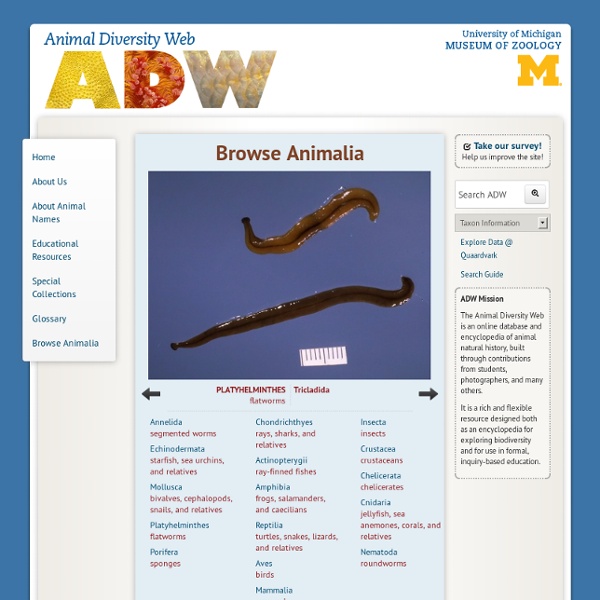



http://animaldiversity.ummz.umich.edu/site/index.html
Related: biologyCell Size and Scale Some cells are visible to the unaided eye The smallest objects that the unaided human eye can see are about 0.1 mm long. That means that under the right conditions, you might be able to see an ameoba proteus, a human egg, and a paramecium without using magnification. A magnifying glass can help you to see them more clearly, but they will still look tiny. Smaller cells are easily visible under a light microscope. It's even possible to make out structures within the cell, such as the nucleus, mitochondria and chloroplasts. California - Homepage Don't panic. The page you are looking for has moved to: As of June 28, 2013, when you go to fossweb.com you will be taken to the new FOSSweb site by default. The old FOSSweb site has been moved to archive.fossweb.com. To get started with the new site, teachers should register for an account.
Learn Biology Online For Free with our Huge Collection of Open Courses If you’ve always been interested to learn more about nature and the diversity of life, you can now Learn Biology Online for Free! Free Biology courses are easy to find yet some of the ones you find may not be worth your time. We’ve put together a list of Biology courses from well-respected institutions such as John Hopkins, Yale, MIT, Stanford, and UCLA. Hopefully, this free resources will help you advance your knowledge of Biology towards a career in education, medicine, research, and agriculture. MOOCs are Massive Open Online Courses.
Celebrating Science - A Family Science Project Whether we realize it our not, everyday we ask ourselves critical questions that involve science. Should I vaccinate my child? Should I buy a hybrid car? Do pesticides on food harm my family and me? For this reason, students graduating from K-12 schools need to develop a basic level of scientific literacy. Whether addressing a mundane or momentous issue, a solid foundation in the sciences is critical for every individual's success and the advancement as a society. Diversity "Diversity is not about how we differ. Diversity is about embracing one another's uniqueness." - Ola Joseph "United we stand, divided we fall." - Aesop (620 -560 B.C.) "Diversity: the art of thinking independently together." - Malcom Forbes "Love the one you're with." - Stephen Stills
How to Use G2C Online There are two ways of exploring the site: Navigation Interact with the dynamic Networks Maps to explore the full catalog of content. It's Plantin' Time! One of the most anticipated science units in my classroom is our study of life cycles. We spend most of our fourth quarter studying the life cycles of plants, butterflies, frogs, and mealworms. It's one of my most favorite times of the year and one that my kiddos really look forward to! Our end of the year open house falls during this time and we made these flower booklets from myLife Cycle of Plants unit to showcase our plant study. However, we had few glitches! It was crazy-time there for a few days!
Wolfram Eukaryote Eukaryotes can reproduce both asexually through mitosis and sexually through meiosis and gamete fusion. In mitosis, one cell divides to produce two genetically identical cells. In meiosis, DNA replication is followed by two rounds of cell division to produce four daughter cells each with half the number of chromosomes as the original parent cell (haploid cells). Ask Nature - the Biomimicry Design Portal: biomimetics, architecture, biology, innovation inspired by nature, industrial design - Ask Nature - the Biomimicry Design Portal: biomimetics, architecture, biology, innovation inspired by nature, industrial desi
top20biology.com Norfolk Botanical Garden - Celebrating 75 years and still growing